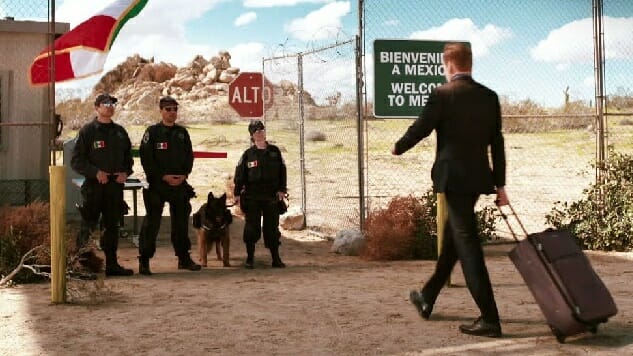Going Without Borders Is Good for Conan and Comedy

If you read enough about late night comedy and late night television, you’ll encounter multiple examples of hosts doing the show, seemingly present “in the moment,” and then forgetting who or what was on the show as soon as they leave the building. Dick Cavett has spoken of and written about the phenomenon, discussed it with Jimmy Kimmel (who also found it to be true), and David Letterman cited it as one of the reasons he ultimately decided to retire.
In other words: the formula of a late night talk show is so present that even those who thoroughly understand what it means to deconstruct the medium and the form in which they’re working can and do tune out.
So not only is the idea of Conan O’Brien turning his show into an Anthony Bourdain-like professional romp compelling, which is something we’ve pointed out previously, but Conan’s focus when he travels is one of the reasons why it would be so compelling.
What do we mean by “focus”? Comedy asks you to ask yourself about the stakes. That gets obscured by the fact that you might go experience comedy in a club, a theater or through a radio or a podcast—and sometimes we confuse ourselves as to what we mean when we try and define the stakes to ourselves, as has been the recent trend with politics and political comedy—but the stakes are there. Think of how something like Seven Minutes in Purgatory—which removes the comedian from the audience, putting headphones over their head to block any chance of hearing an audience reaction—reminds us of the potency of that fact.
So: place yourself in the mess of the world. Assume you’ve been charged with making someone laugh. If you do it wrong, if you don’t assume that someone else might not be capable of enjoying the same engagement with the world as yourself, then you run the risk of coming across as a jerk; if you do it right, you have a recipe with which you can slowly transform the world.
Place that in its most immediate Conan context: Conan walking around Mexico City asking Mexicans to pay for “The Wall.” Outside of this segment, we have Stephen Kinzer writing in The Boston Globe that:
One reason it’s so safe to be American is that we have no enemies nearby … With a barrage of insults and threats, President Trump has begun the process of turning Mexico against us … Our economies are integrated, with annual trade exceeding half a trillion dollars. Our cultural ties are deep. Mexico gives the United States vital help in areas ranging from drug control to immigration—turning back 150,000 Central Americans trying to reach the United States in the last year alone. Most important, Mexico’s friendship helps keep us safe because it means we have no strategic threat on our southern border.
Within the segment, Conan walks up to a citizen, offers up a little deposit box in the shape of a wall and asks him to pay for “The Wall.” The citizen responds by trying to shove his middle finger into the box, and everyone—everyone—laughs.
Throughout the rest of Conan’s Mexico special, we are reminded of the potential for genuine engagement again and again, how easy it can be, and how—even with the ghost of humiliation seeming to hang in the air—there is something so self-evidently sensible and obvious about this method of engagement, too: while dancing in a public park, a band improvises lyrics that includes the lines “The gringo is too skinny / He can barely stand / Just like the cat / who wails and stares at / the meat who hangs from the hook / without being able to eat it … Greetings for Trump / Don’t fuck over my people.” Conan guest-stars in a telenovela as a smoldering cheese salesman. He plays football terribly in a park with Giovani Dos Santos. None of this bears the glaringly obvious hallmark of how—as David Letterman noted in a lengthy interview with Vulture—“at some point publicists took over the talk shows.” Instead, Conan is in a park. He dances in front of a band in another park. He walks into someone else’s television program in someone else’s studio in someone else’s language.
And yet—even without the publicists, even through something as seemingly innocuous in television’s eyes as going to a park—we learn something: we can take note of how all the men in the park applaud the arrival of Giovani Dos Santos, and then pause for a second when Dos Santos goes down the line shaking everyone’s hands, and they’re all ever so slightly unsure of how to react. We can watch the face of the stern old busker who cursed out Trump try not to break into open laughter when Conan loudly announces the fact that he is an American idiot in song—and then goes in—very slowly—for a kiss. We can appreciate the fact that, despite all the bluntness of Conan being presented as a “cheese salesman,” there’s something subtle and sly in seeing him continually forget his hat and be passingly referred to as resembling a Mennonite.
And we don’t have to check every box or quietly kvetch that Conan didn’t have a segment on Juan Gabriel’s death, Juan Pablo Villalobos’s novel Quesadillas or what it feels like when we see Kazuya Sakai’s work twinned with a curation around the theme of monsters as we walk back and forth at the Museo de Arte Moderno. This is about unlocking and unraveling the changing political and narrative landscapes of the world and saying, “How can we engage? What do we have to do first to then make the process better? How do we do this—that is, comedy—for keeps in the real, living world?”
Evan Fleischer is a writer-at-large. In addition to Paste, he has written for The New Yorker, The New York Times, The Washington Post, The Guardian, and numerous other publications.







































